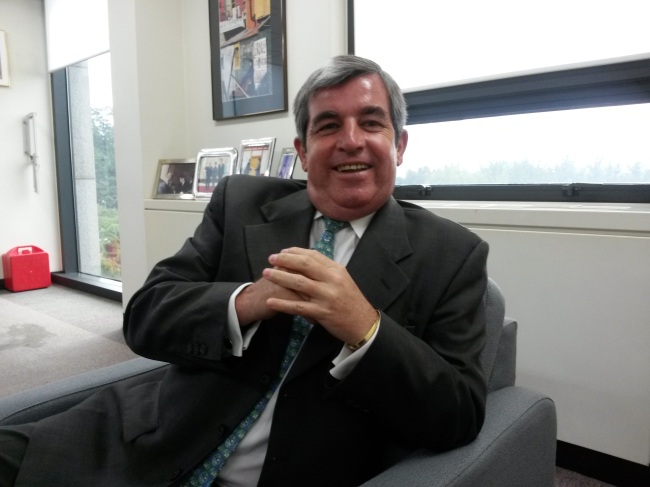With just days before the highly anticipated visit of Pope Francis, Argentina’s top diplomatic representative here recalled the pontiff, as he knew him in the 1980s and early ’90s when the Pope was known simply as “Father Jorge.”
Argentine Ambassador to South Korea Jorge Roballo often met with Jorge Bergoglio before he became Pope Francis, and even before he became Cardinal Bergoglio, when Roballo was himself a junior diplomat covering protocol for the Argentine Ministry of Foreign Affairs and Worship in the late 1980s.
Roballo interacted with him in the course of preparing special events and gatherings of dignitaries, such as Argentina’s traditional Te Deum Mass, which takes place on National Day on May 25 and Independence Day on July 9 at the Cathedral in Buenos Aires.
“He was actually very easy to meet. You could even see him commuting on the subway, walking in the neighborhood or riding the bus,” Roballo recalled during an interview on Monday with The Korea Herald at his office in Itaewon, Seoul. “Actually he was very accessible and enjoyable, quick to smile and to tell soft jokes.”
 |
Argentine Ambassador to South Korea Jorge Roballo recalls his interactions with Pope Francis decades ago in Buenos Aires when the pontiff was simply called Father Jorge during an interview with The Korea Herald in his office in Seoul on Monday. (Philip Iglauer/The Korea Herald) |
Pope Francis is scheduled to arrive in South Korea on Aug. 14 for a five-day visit. It marks the first papal visit to Asia in some 12 years since St. Pope John Paul II visited Azerbaijan in 2002. It is also the third visit of a pope to South Korea, when John Paul II visited for his second time in 1989.
“During those years, I was a junior in my career working in the protocol department. So, I had to interact with him and his fellow priests to organize these Te Deums, coordinate the participation of the foreign diplomatic corps in Argentina, as well as eventual visiting dignitaries,” he said.
“Although I have not seen him since he became pope, you can tell from his pictures on TV and in the newspaper that he has not changed at all. No, he is still the same ‘Father Jorge,’ as he was before becoming Cardinal, much less becoming the Pope.”
South Korea has an active and large Catholic community of 5.4 million Catholics ― almost 11 percent of the country’s population ― including about 4,300 priests and 1,500 major seminarians.
But the country also has a turbulent history of religious repression. Christianity was banned by Korean rulers until 1886. More than 10,000 Korean Catholics were killed for their faith between 1785 and 1886.
One of the two key events during the pope’s visit is the beatification of 124 Korean martyrs during a special Mass in Gwanghwamun Square, after visiting Seosomun Martyrs Shrine at Seosomun Historical Park in central Seoul in the morning. More than 500,000 people are expected to converge in the downtown area of the capital city. The other major focus of the visit of Pope Francis is the Sixth Asian Youth Day.
Due in part to the persecution of Catholics here in the 18th and 19th centuries, South Korea claims the fourth-highest number of Catholic martyrs in the world. In 1984, when St. Pope John Paul II visited South Korea, he canonized 103 Korean martyrs en masse, officially making them saints.
Roballo described Pope Francis when he was Father Jorge as possessing “the same aura” as John Paul II when he had the chance to greet him in the early 1990s. “When you look at him, his smile, his presence ― his aura, the way he talks to the people ― he is so simple and humble.”
The veteran diplomat said he is Catholic along with more than 90 percent of all Argentines, adding that he was particularly proud of Pope Francis both because he is the first Latin American pope as well as the first Jesuit pope in the 2,000-year history of the Catholic Church.
“That marks a real change of the church,” he said, noting that Jesuits are intelligent, well prepared and highly educated, and are always on a mission to help others.
“He is engaged and open to dialogue. Because of his openness and his personality, he was quickly accepted by the whole world. He is a real ‘peacemaker.’ His message has always been about love, dialogue and unity. Latin people, we are like that. He is a true representative of Argentina, sharing a matte, always friendly; a great Latin American.”
The pope’s itinerary is packed with a wide range of events. Besides numerous church-related ones, including sessions with bishops and religious communities, Pope Francis also has a meeting planned with surviving “comfort women” in Korea who were forced into sex slavery by the Japanese Imperial Army during World War II and a meeting with the families of the victims of the Sewol ferry tragedy.
It is rumored he may also have a meeting with envoys from Latin America posted here.
The pope is scheduled to deliver 11 speeches throughout his visit, including four in English, a language he does not frequently use in public. He will deliver the closing Mass at the Asian youth conference in Daejeon.
Francis will also meet with the country’s newly appointed cardinal, Andrew Yeom Soo-jung.
In January, Francis named the 70-year-old archbishop of Seoul a new cardinal, making him the country’s third-ever cardinal after Stephen Kim Sou-hwan, who died in 2009, and Nicholas Cheong Jin-suk, who is 82, and therefore cannot participate in a conclave of the Congress of Cardinals.
By Philip Iglauer (
ephilip2014@heraldcorp.com)








![[Weekender] Korea's traditional sauce culture gains global recognition](http://res.heraldm.com/phpwas/restmb_idxmake.php?idx=644&simg=/content/image/2024/11/21/20241121050153_0.jpg)